By Dale Vernor, Contributing Writer, Classical Wisdom
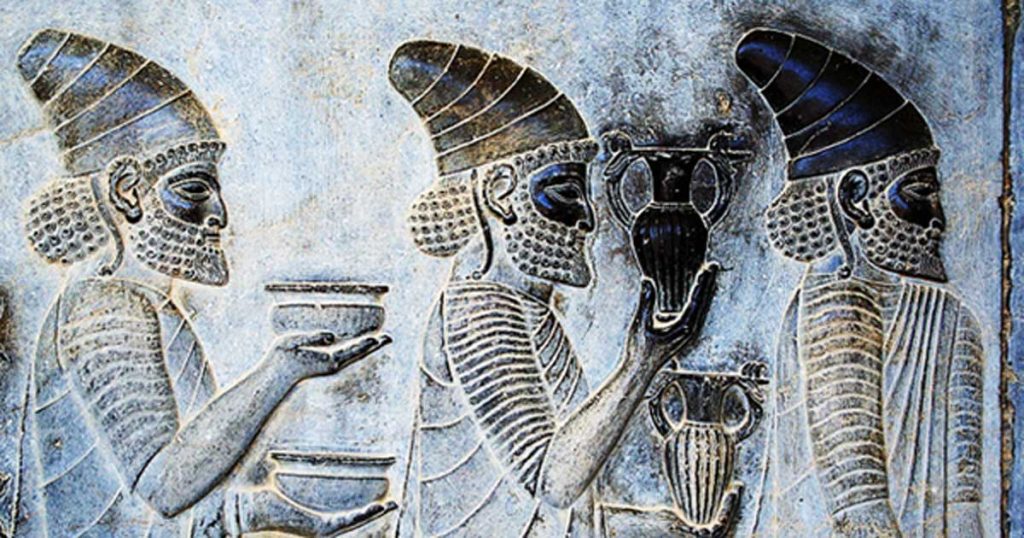
Binge drinking is nothing new. Gilgamesh, the semi-mythic Mesopotamian king who lived around 2,800 BC, is reported to have promised his workers “(a river of) ale, beer, and wine”,… which doesn’t exactly suggest moderation.
Indeed, most practices, beliefs, and attitudes linked to alcohol use date back to the earlier cultures… but that doesn’t mean its consumption didn’t change over time and between cultures.
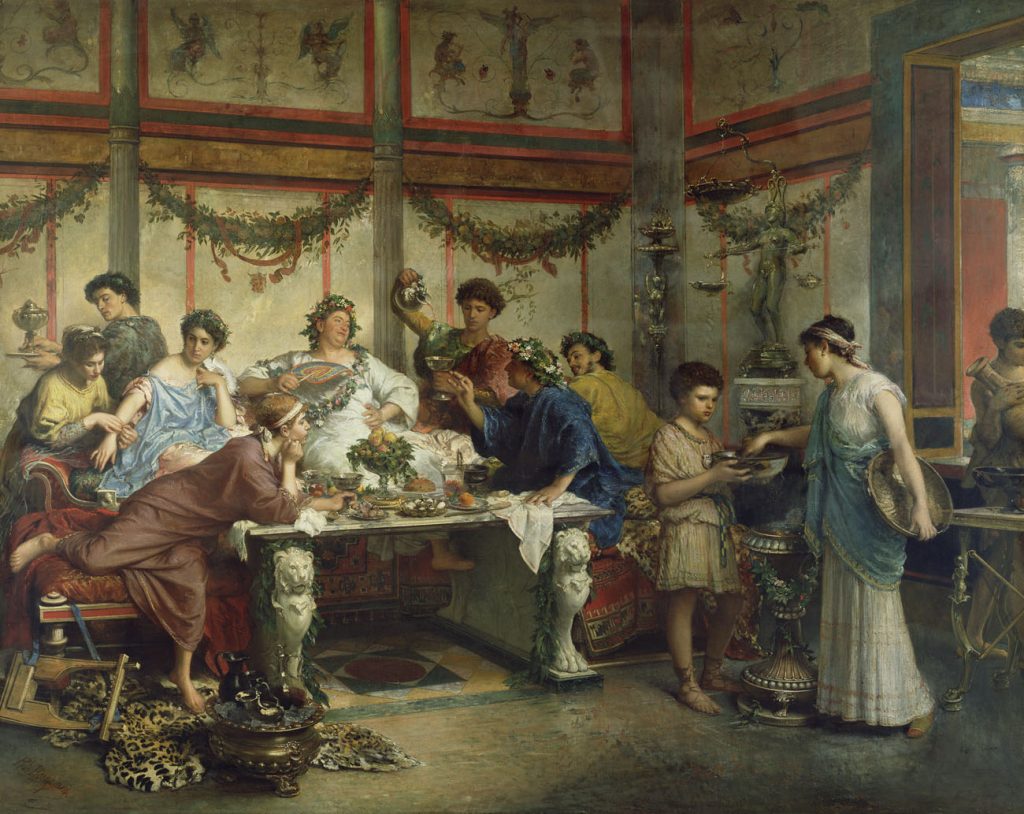
A Roman Feast; Roberto Bompiani (Italian (Roman), 1821 – 1908)
In both the ancient Greek and Roman world, alcohol was an important element often taken for pleasure, for social reasons, and for medicinal purposes. However, as the Roman Empire grew, drinking began to change. The Romans’ traditional values that were modeled on those of the Greeks—such as frugality, temperance, and simplicity—were slowly replaced by heavy drinking and other vices, including degeneracy, blind ambition, and corruption.
Drinking for Pleasure and at Social Settings
The manner in which alcohol, mainly wine, was consumed played a part in preventing or minimizing alcoholism in these cultures.
The consumption of wine was famously a part of the Greek Symposium, an important Hellenic social institution during which young men were introduced into aristocratic society. Men of respected families engaged in discussions and debates while wine was served.
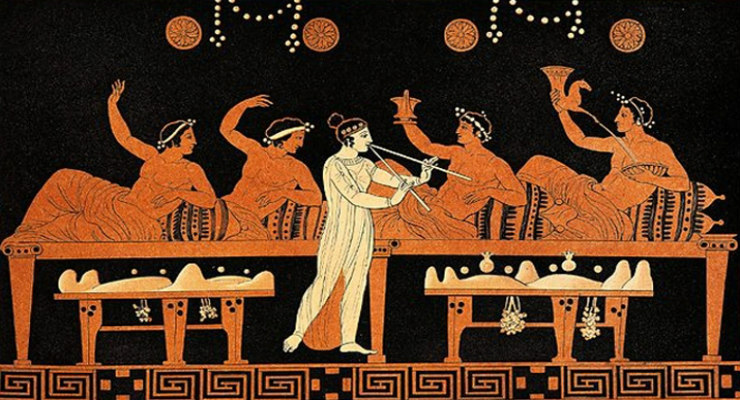
Ancient Greek Symposium
The overseer of the Symposium, the Symposiarch, would decide how the strong the wine should be depending on the kind of discussions to take place. If the event was a sensual indulgence, it would be stronger; for serious discussions, it would be light. Both Romans and Greeks mixed wine with water because drinking pure wine was seen as a habit associated with uncivilized people.
At a Greek Symposium, women weren’t allowed and wine was taken after dinner. At the similar Roman Convivium, wine was served before, during, and after a meal, and women were allowed at the gathering.
When Drinking Got Out of Hand
While foreign visitors occasionally reported of “mass drunkenness”, overall the ancient Greeks were generally considered very temperate among ancient people. Perhaps this was because of their rules and literature that stressed moderate drinking, recommended diluting wine with water, and praised temperance. For instance, Xenophon and Plato spoke highly of moderate wine consumption because it was good for health and promoting happiness, but they were also critical of the habit of drunkenness.
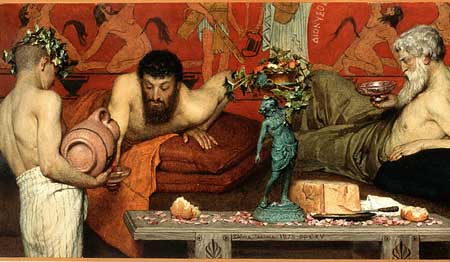
Greek Wine, by Sir Lawrence Alma Tadema
Nonetheless, there were exceptions, folks who believed in drinking to excess.
Take the cult of Dionysus, the Greek god of wine. Followers of Dionysus believed that becoming intoxicated brought them closer to their deity.
The Macedonians also, among Greeks, perceived intemperance as a sign of masculinity, so men could drink to intoxicate themselves. Alexander the Great is a famous example, and may have died as a result of his habit.
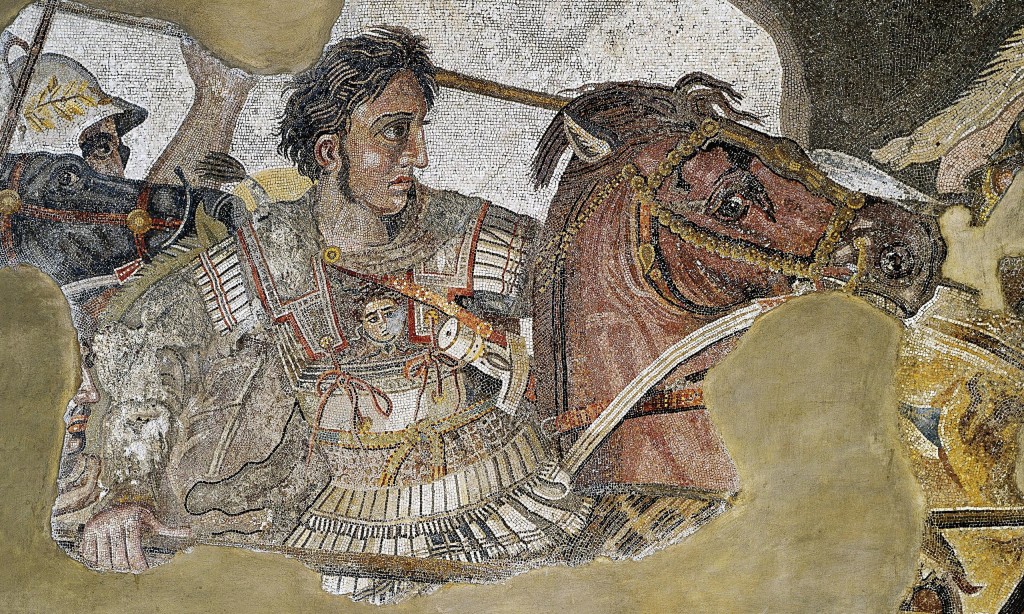
Mosaic of Alexander the Great
Given these and other cases of excessive consumption, it is not surprising that the ancient Greeks had hangover remedies, such as taking boiled cabbage.
In contrast to the Greek ideal, the Romans had drinking habits that encouraged excessive consumption of wine, such as:
- They began drinking before meals on empty stomachs.
- They consumed excessive quantities of wine and food, and then vomited so that they had room for more.
- They played drinking games, including one where somebody would drink as many cups of wine as a throw of a dice indicated.
Clearly, in the first and second centuries BC, it was not uncommon to encounter intoxication among Greeks and Romans. However, initially it was not a universal vice and famous people like Cato the Elder and Julius Caesar only took wine in moderation. As moral values associated with drinking continued to decay, the habit of excessive drinking became more widespread.
Alcoholism isn’t just a modern phenomenon; it was present during ancient times, too. Perhaps today’s alcohol use and abuse is a reflection and an extension of what happened in times before. It was and will be with us always…all that changes is how we deal with it.
Watered Wine anyone?









One comment
Someting I am thinking about. In Ancient Greece the images we have are for ‘organised’ drinking and yet visitors report ‘mass drunkeness’. You are attributing this to following Dionysus as drunkeness was frowned upon in literature. However, I am wondering how much excessive drinking was due to PTSD like effects due to the fairly constant hand-to-hand warfare. It is known that an effect of PTSD is more prevalent in longer tours of duty exacerbated by more personally involved fighting scenarios resulting in excessive alcohol dependancy and increase in violence. The commentators of the time, by imposing values, may simply be inadvertantly highlighting a social problem that was not understood as there would be other symptoms which would not be culturally compatible with the Greek ‘ideal’. Rather than modern alcohol use and abuse being a reflection of what happened and an extension, perhaps it is possible to look at modern abuse groups and look back.
Trackbacks
Our apologies, you must be logged in to post a comment.